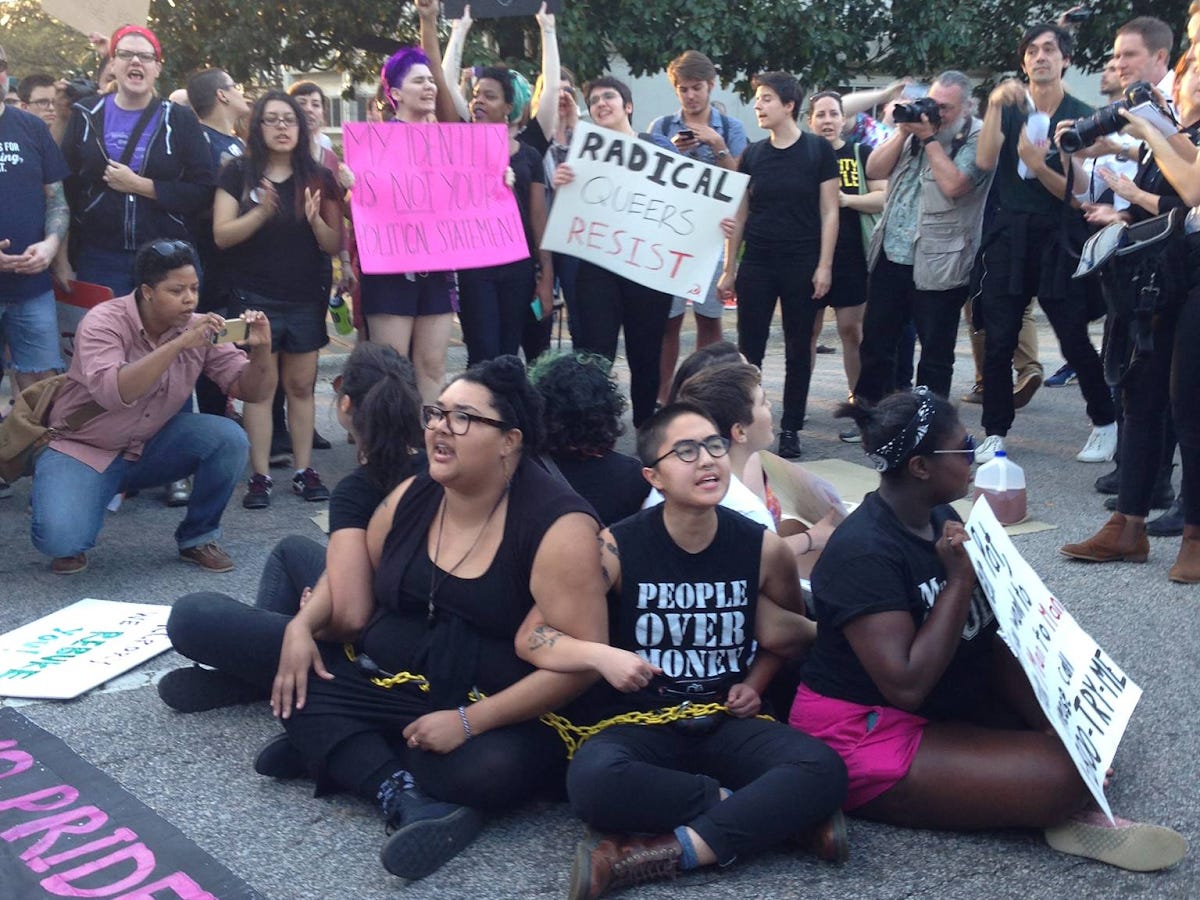Trans People and the New World that Struggles to be Born
Building the power of the multi-racial, multi-national, multi-gendered working class
By Loan Tran
“The old world is dying, and the new world struggles to be born; now is the time of monsters.” — Antonio Gramsci
Crisis after crisis unfolds as our communities seek pathways to power, if not simple survival. The authoritarian playbook is in motion, seeking to redefine the foundations of society—politically, economically and culturally—to prioritize the lives and interests of the few at the expense of the many. This is a time of tremendous instability.
It almost goes without saying, but it is no coincidence that a major target of these authoritarian attacks are trans people. A community who are largely misunderstood and kept at the margins of society—except, of course, for those who choose to assimilate, or “pass,” presenting themselves as non-trans to avoid structural oppression or interpersonal violence. But even this exception is changing: in many places, it is no longer possible to use even limited institutional levers to document with the state the gender with which one lives. And the kicker is that it is not just trans people who are being pulled into this authoritarian agenda. People of all genders are being expected to get in line or be subject to violence and ostracization.
As Gramsci said, now is the time of monsters. The political right will make examples first of those who are easiest to attack, those whose very existence raises too many contradictions for them to bear. In the face of this, the left has both an opportunity and a revolutionary duty to update our understanding of what constitutes the multi-racial, multi-national and multi-gendered working class. This is both a theoretical and a practical task.
Theoretically, periods of heightened crisis are a time to return to basics and deepen our understanding to prepare for the monumental shifts to come. It is not a given that we will pull the balance of history in our direction, but we should train ourselves well for that possibility. Among other things, this means gender liberation must be a core principle of our left power-building agenda.
Practically, every sector of our movement, including the trans liberation sector, must recommit to material struggle. Trans people are too often sidelined or coopted by the mainstream as a “cultural niche,” the question of our identities and experiences limited to debates about pronouns and gender markers. While these are critical components of the material realities lived by trans people, they are but one facet of a much broader set of interpersonal, structural, institutional and systemic issues that our communities face. Ignoring those broader material challenges traps us in an ethereal space where names matter more than whether we live or die.
Trans people are far more likely to be homeless and denied employment in “above-ground” jobs; far more likely to lack access to medical care while being most at risk for HIV/AIDS; and far more likely to experience violence in the streets—both from intimate partners and from the police. These are not new problems. But given the current direction of U.S. politics they are bound to grow worse unless the left takes meaningful action. Anti-trans legislation at the state level has increased suicide rates among trans and non-binary youth by as much as 72%. More than 40% of trans adults have attempted suicide. These rates tell the story of people who were forced to create lives in the margins of society only to find that even the margins are no longer livable.
“Like racism and all forms of prejudice, bigotry against transgender(ed) people is a deadly carcinogen. We are pitted against each other in order to keep us from seeing each other as allies. Genuine bonds of solidarity can be forged between people who respect each others;s differences and are willing to fight their enemy together. We are a class that does the work of the world, and can revolutionize it. We can win true liberation.”
—Leslie Feinberg, Transgender Liberation: A Movement Whose Time Has Come
The material realities facing trans people are not unique to the trans community. Working mothers are often only one check away from eviction. Black people continue to struggle in the shadow of the slave economy in the South and an unfinished Reconstruction throughout the U.S. The carceral state keeps millions of people—disproportionately poor, working class, Black and Brown—locked in cages. Undocumented people pay taxes in this country but face tremendous obstacles when it's time to seek medical care.
Trans people are already at the forefront of the growing service industry workers’ movement in the South. We are on the front lines of the movement against the U.S. funding of genocide in Gaza. We are deeply embedded in the battle against ICE and the abduction of our immigrant loved ones. It is no coincidence that so many trans people are so deeply involved in these struggles for justice and liberation. We have learned through our life experience what is possible when you must transgress and transcend the social norms of our old, dying world in order to survive.
Trans people do not need other sectors of our social movements and our society to support and advocate for us as an abstract gesture of allyship. Because there is a shared, material basis connecting the oppression we face to the struggles of others, there is also a real opportunity to broaden our solidarity. Labor can expand the constituencies it bargains for inside and outside the workplace. Health care advocates can raise sharp questions about who is deemed “fit” for life-saving, life-affirming care. Advocates for housing justice and violence prevention can fight for the rights of all people to enjoy affordable shelter and lives free from fear. We can embrace these opportunities to unite and move together in the direction of life, or we can reject them and perish divided and alone.
The cause of trans liberation cannot rest on the shoulders of trans people alone, but it’s not simply a question of what other sectors of society can do for us. It’s also about the sorts of coalitions trans people are capable of building.
Take, for example, North Carolina’s House Bill 2 (HB2), the notorious “trans bathroom bill.” When the bill was introduced in 2016, we had to move quickly to show that HB2 was not only—or even mainly—about the right of trans people to access public facilities. HB2 contained pages of language limiting the power of municipal governments to enact minimum wage standards and anti-discrimination laws The bathroom bill wasn’t just about trans peoples’ access to public facilities, it was a strategy from the right to drive a wedge between and among oppressed communities.The state was fueling antagonism towards trans people to further limit worker power, people power and left-progressive governing power.
The coalition we built against HB2 wasn’t perfect. Not every worker understood “the hubbub” about trans people, and not every trans person understood the depth of injury to workers at every level. But enough of us saw the throughline—and were willing to struggle through the contradictions—that we were able to dispel the myths about “predatory” trans people and finally nullify that ugly piece of legislation.
We must bring back and deepen these kinds of coalitions, now more than ever. Trans people must continue to do what we do best: create bridges with as many people as possible between the world as it could and should be. This will be more challenging in these extraordinarily difficult times. But we can and must continue to fight for everyone, creating the basis for hope that everyone will fight for us.
“I’m not saying we’ll live to see some sort of paradise. But just fighting for change makes you stronger. Not hoping for anything will kill you for sure … You’re already wondering if the world could change. Try imagining a world worth living in, and then ask yourself if that isn’t worth fighting for.”
— Leslie Feinberg, Stone Butch Blues
I’ve learned from comrades like Leslie Feinberg that identity is a question of action and gender is the language of how we live our lives. I am trans and gender non-conforming both because of a set of conditions that are inexplicable to me, as much as I am also trans and gender non-conforming because I am committed to the political process of bringing a new world into being. I actively choose to root my identity in a left political practice of solidarity and care.
The best affirmation I can hope for from others is not that they get my pronouns 100% correct and most definitely not that they unequivocally support my ideas. The best affirmation of my identity is people’s willingness to struggle together for the power we need to transform the whole of society. I am willing to form the alliances required to do that, even if it sometimes means being deeply misunderstood. And I am willing to sacrifice the personal comfort that keeps us from conflict and connection with each other—if others are willing to do the same. I am hopeful that if we are all able to do this, the contradictions within our class will be resolved on the road to liberation.
To be trans is to say that the world as it is is not the way it should or needs to be in perpetuity. That capitalist exploitation can be a story of the past than we laugh at in ballrooms and at drag shows. That there is enough room in the world for all kinds of desire, families, and communities of care. That in every moment there is the promise and opportunity to become more and more human. That the new world that struggles to be born can be brought into being. Because trans people have seen what is possible—and we refuse to keep all the good things to ourselves.
Loan Tran is a Southern based organizer who considers themselves forged in the immigrant justice struggle led by undocumented, young, queer and trans people. They immigrated from Viet Nam to the U.S. with their family as a direct result of the American war in their home country. Loan has spent more than 15 years in movement, building coalitions rooted in building solidarity and power across issues, identities, and geographies. They are a founding member of Viet Left Power, a new political organization for Viet organizers in the U.S. committed to building with working class Viet communities. Loan currently serves as the National Co-Director of the Rising Majority where their efforts focus on cohering social movement left forces around a shared vision, strategy, and program. In their spare time, Loan attempts to write to make meaning and amplifying the radical potential of what is seemingly mundane.





Thanks for this moving and brilliant article that gets to the heart of matters--we all need to live through our discomfort, honor the aspirations of (even when we don't fully understand them) and join in struggle with all people who want to end oppression and exploitation. I am hontored to have shared space with Loan in movement circles, and look forward to years of collaborative work.
I want to quote every other sentence! Thank you for this brilliant piece.